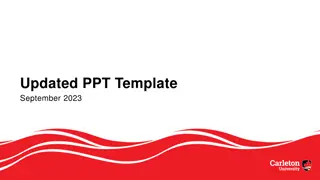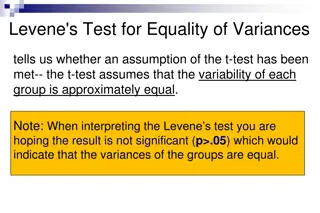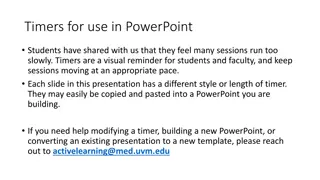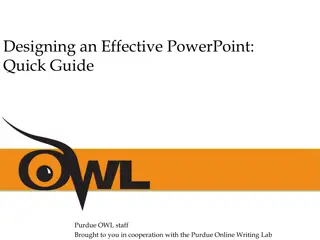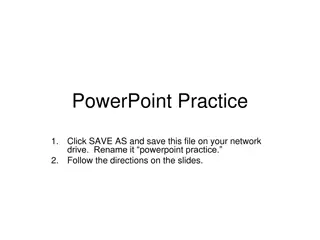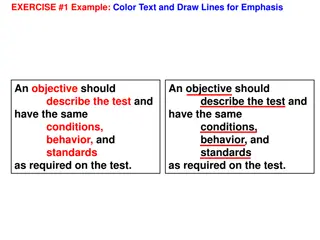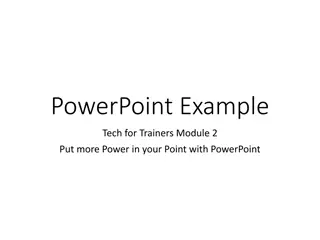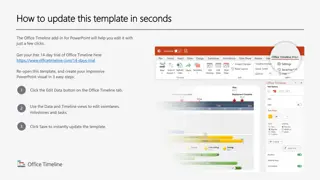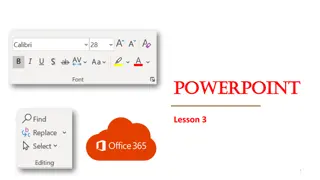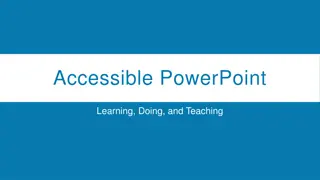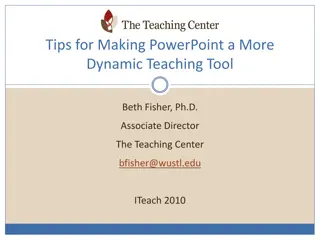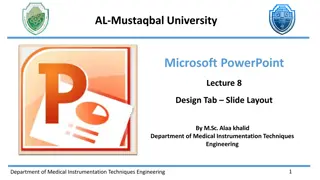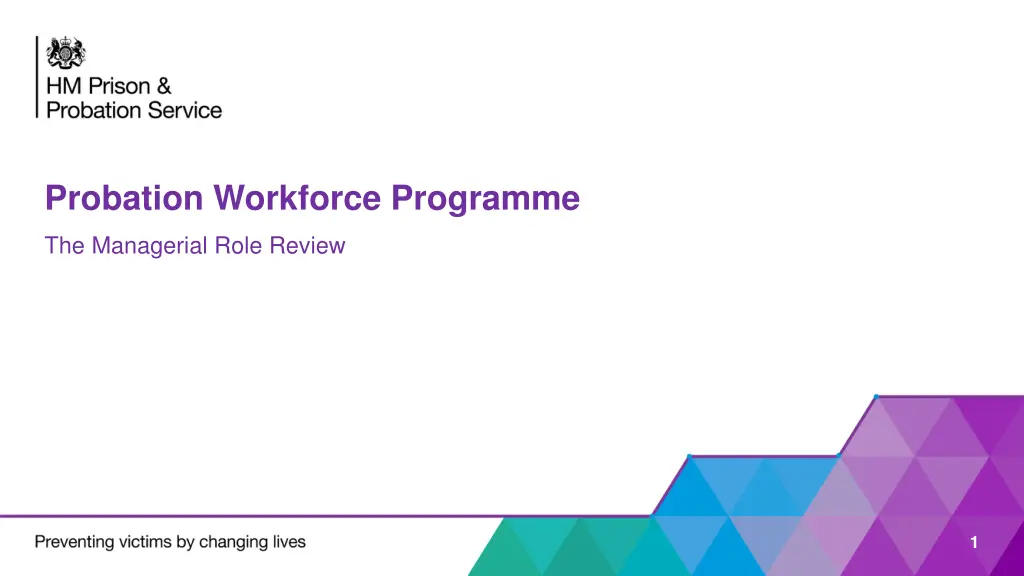
Enhancing Probation Workforce Management: A Review of Managerial Roles
"Explore the commitment to improving Probation Workforce Programme through Managerial Role Review, addressing workload management, recruitment strategies, and organizational design challenges. Recommendations focus on clarifying job roles and enhancing workforce planning for better efficiency."
Download Presentation

Please find below an Image/Link to download the presentation.
The content on the website is provided AS IS for your information and personal use only. It may not be sold, licensed, or shared on other websites without obtaining consent from the author. If you encounter any issues during the download, it is possible that the publisher has removed the file from their server.
You are allowed to download the files provided on this website for personal or commercial use, subject to the condition that they are used lawfully. All files are the property of their respective owners.
The content on the website is provided AS IS for your information and personal use only. It may not be sold, licensed, or shared on other websites without obtaining consent from the author.
E N D
Presentation Transcript
Probation Workforce Programme The Managerial Role Review 1
The Managerial Role Review (MRR) is committed to improving the capacity and efficiency of SPOs whilst working towards The Probation Workforce Programme s (PWP) six priorities to 2025. Deliver a workload management tool and workforce modelling capability. Implement a Recruitment & Retention Strategy. Attract 1500 PQiPs each financial year to 2024. Implement the 21/22 & 22/23 Pay Agreement and Competency Based Framework Developing a fully resourced Learning Development Model Create a Professional Register 2
Methodology Timing activity workshops Qualitative focus groups Data analysis and document review 3
You become almost a dumping ground for everything [ ] Being given more and more roles, particularly on the back of COVID, where you don't actually have the time to do it properly, well, to do the main role as well as the additional stuff. Organisational Design SAOs and business managers, there's lots of things they should be doing, but our staff shortages go right across. So if your SAO is as brilliant as mine is, but is managing God knows how many staff across two offices that are quite a long way apart and is absolutely on her knees, the last thing I'm going to do is say, oh, actually, this is your job. It just doesn't work like that. think we have developed a culture [ ] that if somebody doesn't have the capacity it falls to Offender Management to pick up. As if there is an infinite amount of capacity amongst these individuals [ ] I'll do anything to support anyone to learn and get them the opportunities and the shadowing opportunities, but with the best will in the world, I don't have time to sit with someone and train them. The management support hub I think it should be called the Just do it yourself hub , I don't see the point of it at all. It is useless 5
Organisation Design Recommendations Review of Business Manager Role, the scope of this is considered too wide with SPOs picking up additional tasks. Clarify Job Description through Job Evaluation Scheme (JES) to enable SPOs to focus on key operational tasks. PODs to be implemented as part of the Target Operating Model. A review of the Learner Support Model Roles to explore the relationships between PTA, QDO, SPO PQiP and SPO. Review Management Coordination Hubs ensuring the benefits are fully realised. Pay band 5 to be reviewed as part of Probation Pay Reform in consultation with Trade Unions. 6
Workforce Planning and Resource Planning Modelling The amount that has then been put onto an SPO to be able to do on top of everything else has been unmanageable, quite frankly. When you've got an entire team that are operating at 130 or 140, 168%, what does that say about your own workload in it? We ve still got half the number of staff, probation service officers we re due to have, we re short of managers, we re short of case administrators. We haven't got nearly the staff we need, staffing is the biggest issue at the minute. It takes ridiculous amounts time to get staff through the door and trained and doing their job. We've always had quite a high turnover of staff, [ ] and what I've noticed, particularly the last two years, [is] really struggling to retain any staff, not just the experienced ones, but even the new ones coming through, because of the massive workloads, and they're looking for ways out very quickly. I think all of those people who are leaving would be saying about the pace of change and the ridiculous expectations, and that we're almost becoming like a child protection social workers who burn out in 2 , 3 years. 7
Workforce Planning and Resource Planning Modelling Recommendations Recruiting to fill SPO shortfall to bring spans of control to intended ratio, following this, there will be a further review of spans of control and target staffing. Provide administrative support to SPOs SPOs are the only operational grade without direct administrative support. A ratio of 1 case administrator to 5 SPOs has been suggested. This would need to be impact assessed before being added into target staffing for 2023/24. HMPPS take a longer-term approach to resource modelling SPOs. This would involve using Activity Based Costing (ABC) methodology to determine how long attributable tasks take. PQiP Recruitment and Workforce Planning to reduce high workloads. Retention of experienced staff through recruitment and retention strategy. Demand Management Strategy will aim to remove non-essential tasks from SPOs. Improve data quality on SOP. Maintain the SPO PQiP Role. 8
Systems and Process Improvement I wonder whether we can use digital solutions better. I think the amount of times you have to double and triple key stuff into different places, you have to put it into ND, you always have to put into an email and stuff like that, whether there's better things. One issue with the QA tools are they are often a sledgehammer to crack a nut. The managerial oversight that's required now is unreal. But maybe we were doing that, but it wasn't in such a recorded way. I have no problems with the touch points model 'cause I can understand the reasons why it's being introduced, but it's almost not possible to focus on the touch points model alongside all those other things that everybody has just mentioned, which is obscene. You can lose half a day to trying to do a task on SOP. SOP is a minefield. It's almost impossible to find the correct process we are supposed to follow. 9
Systems and Process Improvement Recommendations Improve SSCL processes, forms and provide a feedback loop for ongoing development. National Reporting solutions, review options for P&Q dashboards to be embedded nationally. Review JitBit to consider further utilisation for Management Coordination Hubs. Digital Design and Technology Board Improvement of systems/processes. Smarter working to be promoted and embedded nationally. Exit interviews to be recorded centrally to better inform policy decisions. National approach to case transfers between regions. The Countersigning Framework, this requires evaluation to assess the impact and modify if required. A review of the Core Quality Management Framework (CQMF). 10
Capability and Development For me the value of that model [SEEDS2] cannot be understated, in terms of the purpose of supervision, the use of observation I've been landed with a basically a disciplinary investigation to do, which is a serious allegation, that could end up with someone being dismissed. So I've got no help for that, it's literally here's the policy, you familiarize yourself with that, arrange a meeting, do the report on this template and it all needs to be done by this date . So I'm going to do that because I've been asked to do it and that's my job. But if I get that wrong, that is serious for that person. We need proper trained HR professionals to do disciplinary meetings, not some bloke who was a probation officer and is now an SPO.[ ] I think the structured mentoring programme for new officers would be good, new mangers, and then a refresh, if you had a structured programme of training for new managers, because the new managers are often the better ones, to be honest with you. It feels like we've gone back to micromanaging staff, and I wonder if that's because what we're not investing is the time and effort to the team to develop their ability, their knowledge, their confidence. 11
Capability and Development Recommendations The development of SPO Continuous Professional Development (CPD) role packs and specific CPD on HR. Strength based approach to recruitment of SPOs. SEEDs learning and development to support delivery of Reflective Practice Supervision Sessions and enable staff. First Line Manager Training for SPOs when they come into the role. Promotion of Aspiring Leaders Programme. The Leadership Journey, a new training initiative with online content and peer-to-peer learning. Communities of Practice Framework, this would aim to promote peer-to-peer learning and support for SPOs allowing regular meetings to share experiences, knowledge and reflect on ideas or problems. Review of Greater Manchester Talent Scheme, this has been developed and implemented within Greater Manchester to enable CPD for SPOs and Probation Practitioners. The recommendation is for PWP to monitor the progress of this programme to consider if it could be implemented in other regions. Review of PQiP Training Programme. Professional Registration to empower PP and move the responsibility of CPD to an individual employee. Further promotion of the PSO Pathway 12
Change Implementation and Culture Absolutely I can see some benefits and the reasons why it might have been introduced, [ ] but all of a sudden, we're told, right, you need to do that . Well, OK, but how are you creating the space to make that possible, in any way. The other thing is the amount of information we get sent. [ ] There seems to be so many different strands of communication that [ ] sometimes I don't even know where it's come from. [...] there seems to be a massive information overload. Sometimes I dread turning on the computer just to see how many new emails I've got, not from the team but from external, that I have to work out then, what do I do with them, and how much do I need to push these things as well? Is it a national guidance, is at a local guide? What is it? The amount of new processes like, here's a new enforcement process, we ll tell you about it the day before. Just it roll out to your staff and we haven't even had time to absorb it, [ ] don't have the time to fully read it and understand it. And then we're expect to implement that the next day. Everything that's come with reform and unification, that s presented so many challenges, particularly around allocations, we re a new PDU with a new management team. [ ] That assimilation of cultures from legacy teams as well, I think it is definitely a challenge. 13
Change Implementation and Culture Recommendations A review of the Touch Point Model to ensure it is reflective of the work we do post unification. Human Factors Pilot, this has been implemented in some prisons and the Youth Custody Service allowing for checklists, structured communications and teams having open conversations about what is achievable. To improve the impact of change within HMPPS Promotion of Reflective Sessions through PAM Assist employee support. 14
Probation Workforce Programme to implement key recommendations and monitor the wider recommendations. Recommendations Wider HMPPS Functions & MOJ Other workstreams within PWP Managerial Role Review Team 15
Next Steps The recommendations have been approved and are now in the implementation phase. SPOs and their teams should begin to see improvements during the third and forth quarters of 2022. June 2022 to December 2022: SPO Case Administrators to be appointed and a review of the benefits to commence in September 2022. The SPO role to go through the Job Evaluation Scheme. A review of the Touch Point Model (to be completed by EPSIG) with support from the MRR team. A review of the Learner Support Model. Future Steps: A review of the Business Manager Role A review of SPOs working in other areas, including Prisons and Interventions. Obtain remaining activity timings to complete an SPO resource model. The MRR Report can be read by selecting the following link here Should you have any comments or questions, please email the MRR Team at: MRR@justice.gov.uk 16

